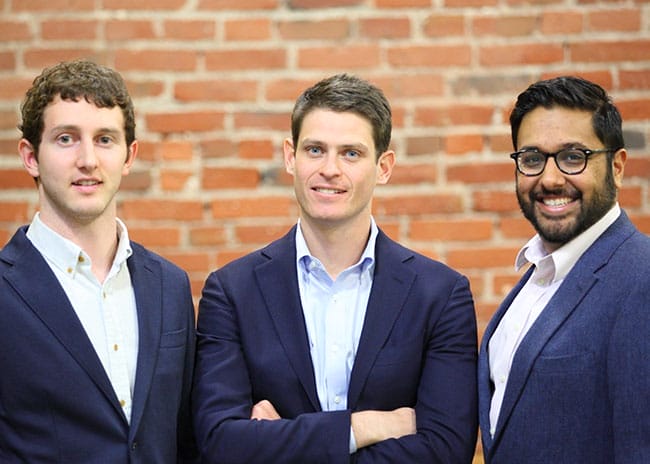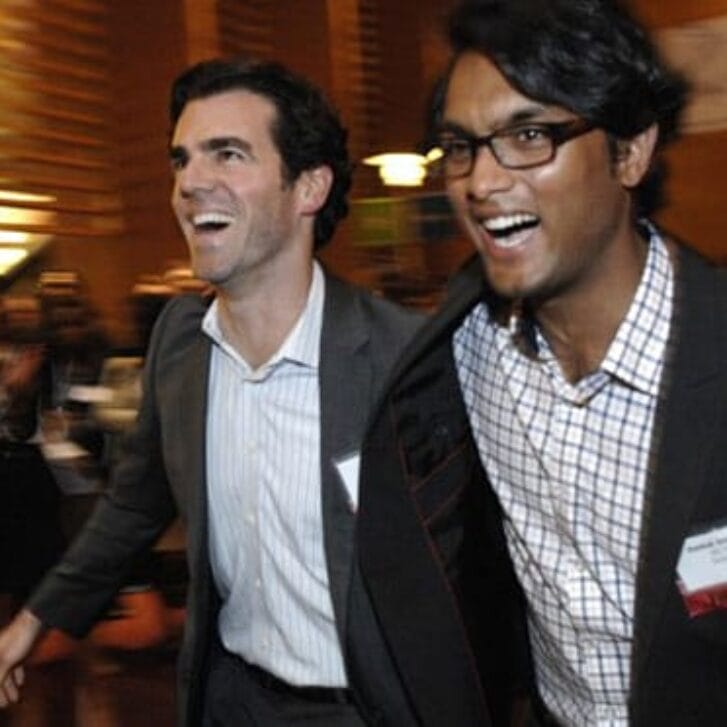Conventional wisdom used to be that Wharton was strictly a finance school. At a certain point, Wharton became known as a factory that churned out bankers and consultants. But this stereotype is wildly outdated. (To an extent, was it ever accurate in the first place?) Exhibit A: The new dean, Geoffrey Garrett, has put innovation and data analytics at the center of where Wharton is going. This is exciting because it reflects not only the future direction of the institution but also validates the foundations that already exist.
Despite a strong pull toward traditional roles on Wall Street and with the Big Three consulting firms, more and more students are starting businesses out of the MBA program. More than 7 percent of 2013 Wharton MBA graduates started a business right after graduation (the highest amount on record), and anecdotal evidence suggests that even more 2015 MBA graduates will opt to.
Underlying every statistical trend, there are countless individual stories. Here’s one of them: This post is dedicated to sharing reasons why my co-founders and I have decided to pursue our startup, Abaris Financial, full time.
A Supportive Network
As an early-stage entrepreneur, many people are going to look at you like you’re crazy. There’s no avoiding that, and it’s OK. It’s easy to brush off the aspersion if you have a critical mass of smart and motivated people around you pursuing a similar path. This is one of the most important attributes of a successful startup ecosystem. As much as some entrepreneurs may tell you that they don’t care what other people think, the reality is that social proof matters, and your peers represent a powerful form of it.

Resources for entrepreneurs abound across Penn’s campus. Photo credit: University Communications.
At Wharton, we’ve been fortunate enough to be surrounded by countless founders and companies that have as good a chance as anyone at changing the world. Through groups like the Penn Founders’ Club, the MBA Entrepreneurship Club and the Wharton FinTech Club, we’ve been exposed to peers grappling with similar startup problems and facing similar career choices. As we’ve seen our classmates secure funding, win prestigious business plan competitions and land in top-tier accelerators, it’s shown us the realm of what’s possible.
Having a Plan That’s Been Stress Tested
Vague notions of “revenue,” “achieving product-market fit” or “scaling” don’t constitute a plan. These are things early-stage startups need to accomplish, but alone, they are not enough. A plan enumerates how you’re going to hit these milestones. There are so many variables at the early stages of a new venture. As a result, some think that plans are worthless because they are susceptible to frequent changes. I vehemently disagree. In an early-stage startup, a plan is a North Star. It guides the founders’ efforts on what’s most important, not on what’s most urgent, and prioritizes a never-ending list of things you could do.
Since day one, we’ve been vigilant about always having a near- and long-term plan that we could go back to. This has been a powerful tool in tracking progress to see if we were moving in the direction we had set for ourselves. Having a plan readily available has also allowed us to stress test what we were doing with classmates and professors.
Outside Validation
Believing in what you’re doing is necessary to being a successful founder—necessary, but not sufficient. At a certain point, you need others to see the potential of what you’re building. For us that validation came in our classes and then through startup competitions hosted on campus. We got very positive feedback for our business plan in the management course that focuses on new venture development taught by Ethan Mollick, Wharton’s Edward B. and Shirley R. Shils Assistant Professor. Then last spring, we won the Wharton Venture Award. The award was selected by an alumni panel that included Mo Koyfman, C’00, W’00, of Spark Capital and Rob Coneybeer, WG’96, of Shasta Ventures. Late last spring, we competed in the finals of the Wharton Business Plan Competition and gained admittance to the Venture Initiation Program. By midsummer, we had secured the angel financing that gave us the near-term funding we needed to finish some technology projects and go full bore into customer acquisition.
It’s rare that deciding to forgo a more traditional career path and pursue a startup full time is a no-brainer decision. But if you’re in a supportive startup ecosystem like Wharton’s, you’re more likely to critically reason through the decision and make the right choice. Wharton has been an incredibly supportive environment to launch our company, and I intend to finish my degree. It’s where I met my co-founders, refined the business idea, rounded out some critical skills I was missing and got the validation that made me certain I was chasing an idea worth pursuing.
In some circles, starting a company is perceived to be a large risk to your career. At Wharton, when you have the right team and a strong idea, the biggest risk is not going for it.


























